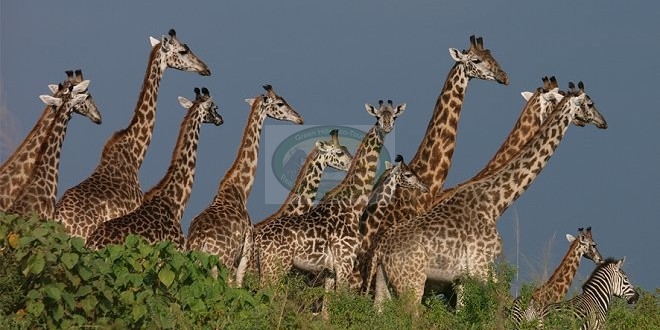Arusha National Park – Tanzania
The closest national park to Arusha town – northern Tanzania’s safari capital – Arusha National Park is a multi-faceted jewel, often overlooked by safarigoers, despite offering the opportunity to explore a beguiling diversity of habitats within a few hours.
The entrance gate leads into shadowy montane forest inhabited by inquisitive blue monkeys and colourful turacos and trogons – the only place on the northern safari circuit where the acrobatic black-and-white colobus monkey is easily seen. In the midst of the forest stands the spectacular Ngurdoto Crater, whose steep, rocky cliffs enclose a wide marshy floor dotted with herds of buffalo and warthog
Further north, rolling grassy hills enclose the tranquil beauty of the Momela Lakes, each one a different hue of green or blue. Their shallows sometimes tinged pink with thousands of flamingos, the lakes support a rich selection of resident and migrant waterfowl, and shaggy waterbucks display their large lyre-shaped horns on the watery fringes. Giraffes glide across the grassy hills, between grazing zebra herds, while pairs of wide-eyed dik-dik dart into scrubby bush like overgrown hares on spindly legs.
Passing first through wooded savannah where buffalos and giraffes are frequently encountered, the ascent of Meru leads into forests aflame with red-hot pokers and dripping with Spanish moss, before reaching high open heath spiked with giant lobelias. Everlasting flowers cling to the alpine desert, as delicately-hoofed klipspringers mark the hike’s progress. Astride the craggy summit, Kilimanjaro stands unveiled, blushing in the sunrise.
About Arusha National Park
Size: 552 sq km 212 sq miles). Location: Northern Tanzania, northeast of Arusha town..
What to do
Forest walks, numerous picnic sites; three- or four-day Mt Meru climb – good acclimatization for Kilimanjaro.
When to go
To climb Mt Meru, June-February although it may rain in November.
Best views of Kilimanjaro December-February.
Visit Arusha with Green Hills Ecotours, you will also be helping to ensure the survival of this magnificent creature and support a sustainable responsible tourism in Tanzania.
Book your Tanzania eco-safari holidays at: Ecotours@gmx.com
 Green Hills Ecotours For all kinds of tours in Central Africa
Green Hills Ecotours For all kinds of tours in Central Africa
